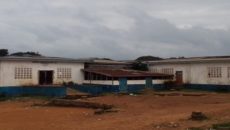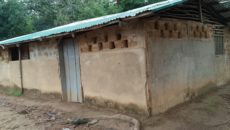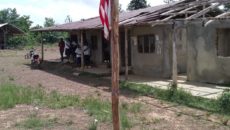MONROVIA, Montserrado – As the controversial Partnership Schools for Liberia initiative enters its second year, a report conducted by the Center for Global Development has revealed that the program is costly to run, although it significantly raised students’ learning in its first year, compared with standard public schools.
PSL, a public-private partnership, was among key steps introduced by Education Minister George Werner upon taking office to improve the quality of education in Liberia. The move was in response to an often-quoted speech by President Ellen Johnson Sirleaf in 2013, where she described the country’s education system as “a mess†after more than 25,000 candidates failed to pass the University of Liberia’s entrance exam.
Liberia’s education system has trailed most of the world in both access and quality. Net primary enrollment was only 38 percent in 2015, and among adult women who finished elementary school, only 35 percent could read a complete sentence, according to a 2014 World Bank report. Learning levels were also measured to be low.
Under the PSL program, the Liberian government delegated management of 93 public schools to eight contractors. Teachers in PSL schools remained on government payroll; schools remained free to students and the property of the government, and contractors were prohibited from screening students based on ability or other characteristics.
In addition to new management, PSL brought extra resources. While the government-managed public schools continued on a budget of approximately US$50 per pupil, PSL contractors received an additional US$$50 per pupil, as the value of US$100 per pupil was believed to be a realistic medium-term goal for public expenditure on primary education nationwide.
The Center for Global Development was contracted to conduct an independent evaluation of the program to determine whether it was worth significantly scaling the program. A group of control schools that fit the characteristics of PSL schools was also randomly selected. Those control schools remained government-ran and were compared against the PSL schools.
“After one year, public schools managed by private contractors in Liberia raised student learning by 60 percent, compared to standard public schools. But costs were high, performance varied across contractors, and contracts authorized the largest contractor to push excess pupils and underperforming teachers onto other government schools,†the organization concluded in its findings.
Overall, the report found that enrollment levels did not change, but said there were signs that some children were turned away from their schools when PSL arrived. The Bush Chicken reported on some of the euphoria during the enrollment period at schools run by Bridge International Academies. There was such a high level of interest that the cap of 45 students per classroom was raised to avoid leaving students out. Even so, parents and civil society organizations were concerned that many students would be left unenrolled.
However, the report concluded that the issue was mostly restricted to Bridge International Academies and most of those students were absorbed into other schools. As the program enters its second year, those reports of students being left unenrolled have largely been under the radar, suggesting that the issue has been dealt with.
On a related note, the report said the Ministry of Education made special staffing arrangements for PSL, even though teachers are in short supply in Liberia’s public schools. The group found that the government assigned PSL schools 37 percent more teachers than non-PSL schools, including the first pick of better-trained, newer graduates.
It says, in the short term, without a significant increase in the supply of trained teachers, the staffing advantages given to PSL appear unsustainable at a larger scale.
According to the report, Bridge International Academies also dismissed half of the incumbent public teachers in its schools. In theory, these teachers are still paid by the government and may be working in other public schools or collecting pay without working.
The research institute concluded that while weeding out poorly performing teachers is important, a reshuffling of teachers is unlikely to raise average performance in the system.
The third most significant critique of the program by the report was that it was not being tested in average Liberian schools.
“In the first year, the program was implemented (and evaluated) within a list of eligible schools agreed by contractors; these schools had higher staffing levels and better infrastructure and were located closer to roads than average Liberian schools,†the report said.
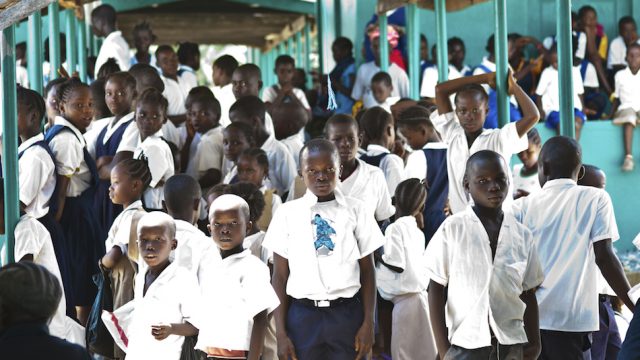
A school located in one of the many inaccessible regions: photo by Lloyd Massah
It recommended that clear, uniform procurement rules might better align contractors’ incentives with the public interest.
It noted that in the first year, six of the eight contractors were contracted through an open, competitive bidding process, while one contractor (Stella Maris) did not complete contracting, did little work, and produced low learning gains. Additionally, another contractor, Bridge International Academies, which was selected outside the competitive process, produced strong learning gains, but removed most teachers and displaced some students.
“Revised contracts and competitive selection of contractors based on performance might mitigate these issues,†the research group advised.
Amid all the criticisms, the report concluded that on average, partnership schools improved teaching and learning, with students in PSL schools gaining the equivalent of an additional 30 weeks of schooling for English and 34 weeks for mathematics.
This comes as no surprise, as the students in partnership schools spent twice as much time learning each week, when considering reduced absenteeism, increased time-on-task, and longer school days in PSL schools.
The report also concluded that the program increased teachers’ quality of instruction.
“Teachers in PSL schools were 20 percentage points more likely to be in school during a random spot check (from a base of 40 percent in control schools) and 16 percentage points more likely to be engaged in instruction during class time (from a base of 32 percent in control schools). This holds even after controlling for changes in the composition of teachers,†it says.
However, the report pointed out that the costs of running the program were high, in terms of government staffing and private subsidies.
The report says budget estimates for some contractors in the first year exceeded the program’s long-term target: “Rather than US$50 per pupil, contractors’ ex-ante budgets ranged from US$57 for Youth Movement for Collective Action to US$1,050 for Bridge International Academies (later revised to US$663).â€
“Learning gains varied widely across contractors, and higher costs do not necessarily correlate with higher learning gains,†it added.
While the results appear to be promising, the Center for Global Development wrote that the government should hold off on dramatically expanding the program. It advised that the remaining two years of the three-year pilot and evaluation should be used to test additional refinements and build up the public sector’s capacity to hold contractors accountable.
Some international aid agencies and local civil society groups have sought to capitalize on the report’s findings to call on the Liberian Government to radically review whether it is worth pursuing the pilot project when there are so many other more effective ways to improve the quality of education for children.
Organizations like ActionAid International, Global Campaign for Education, and the Center for Transparency and Accountability in Education are leading the campaign.
They are joined by a network of civil society organizations which includes the African Network Campaign on Education for All; Civil Society Action Coalition on Education for All in Nigeria; East African Centre for Human Rights in Kenya; Initiative for Economic and Social Rights in Uganda; Global Initiative for Economic, Social and Cultural Rights; and Right to Education Initiative.
In a joint statement issued on September 7, the organizations called on the Liberian government to immediately revoke the contract of providers that are not cost-effective, that limit access to students, try to manipulate the pilot, or undermine the education system as a whole.
They reaffirmed their global request to investors to immediately cease support to Bridge International Academies, while at the same time calling on all the concerned governments where Bridge operates, including India, Kenya, Liberia, Nigeria, and Uganda, to immediately take all necessary measures to ensure that the rights and integrity of children affected by Bridge are safeguarded and that all schools not respecting minimum educational standards are closed.
According to them, the latest study also confirms a long-standing worry of civil society that Bridge tries to skew results by pouring in large sums of money in an unsustainable way, picking better schools, and that the company is based on a flawed business model.
“This new study also confirms a range of other independent studies – including from academics, civil society, and journalists – on Bridge Academies conducted in Kenya, Uganda, and Nigeria, that all showed similar practices, poor learning gains, and an unsustainable business model, in addition to violations of the rule of law,†the statement read.
A statement signed by 174 organizations published, last month, called on investors to cease all investments in Bridge Academies and take immediate steps to addressing the issues identified.
According to the head of the Center for Transparency and Accountability in Education, Anderson Miamen, a public-private partnership is the wrong approach for Liberia.
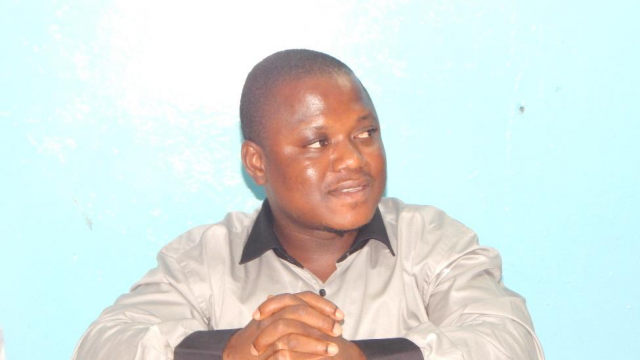
Anderson Miamen, Head of COTAE speaking at a press conference, in Monrovia. Photo: Gbatemah Senah
According to Miamen, the program has opened the door for dodgy providers, such as Bridge International Academies, to profit from the system, while not providing sustainable solutions.
“Huge investment in BIA under the pilot, with woeful results, shows its ineffectiveness,†he said.
“Therefore, we urge the Liberian government to abandon the PSL program and redirect its energy to pursuing more holistic and sustainable reforms that protect the rights of all children and improves learning outcomes across all levels of the education system.â€
He wants the government to begin by immediately revoking the contract with Bridge, which according to him, “not only does not improve the learning more than any other school but weakens the system as a whole by pushing out children and teachers onto other schools.â€
The Liberian Ministry of Education has welcomed the results of the latest independent evaluation. It says the report highlights a significant improvement in education outcomes in PSL schools.
According to a release issued by the ministry, Education Minister Werner said the ministry was pleased to see strong, independent evidence that the PSL program is achieving the targeted objectives to improve education quality and increase learning outcomes.
“Ultimately, my job is about providing better opportunities for all Liberian children and giving them the tools they need to succeed. This evidence makes it clear that PSL is helping to achieve that goal,†he said.
According to the release, the learning gains identified by the latest research combined with the improvement in test scores across all public schools for the 2016-17 academic year, the ministry believes, illustrate that its ambitious reform plan is already making a significant difference.
“The Ministry of Education called for Liberians to support the work of educators within the Partnership School for Liberia program after misleading statements aimed at undermining the independent evaluation of the program, were released to overshadow the significant learning gains highlighted in the report,†the release further disclosed.
Werner said it was unfortunate that groups that are ideologically opposed to the program have circulated misleading statements regarding the independent evaluators’ report.
“As Liberians can see for themselves in the report, the conclusions of the independent evaluators bear little resemblance to the claims made by these groups,†he clarified.
“The Ministry welcomed the constructive feedback from the independent evaluation team regarding areas where the PSL program could be improved. The report findings provide evidence that new program elements already being introduced to PSL in Year 2 are well-founded,†it revealed.
Regarding the financial sustainability of the PSL program in year 2 and beyond, Werner said one of the goals of PSL was to find a model that could fit within the reality of existing budget constraints.
“When we set out to launch the PSL program, we wanted to find education models that could work within the reality of our constrained budget. However, we also welcomed some providers’ efforts to raise additional funding from international donors in order to supplement our budget and provide much-needed resources. We are grateful for these donors’ generous support,†he pointed out.
The Ministry noted that other than Bridge International Academies, which financed their schools entirely through their own independent fundraising, all providers within the PSL program were offered the same US$50 per pupil stipend from a pool of philanthropic funds raised specifically for PSL.
“All the philanthropic funds raised came from new education donors for Liberia, and providers did not receive any funding from the Government of Liberia,†the ministry release disclosed.
The ministry has already earlier announced the final allocations of schools for the second year of the program. The additional schools increase the total amount of PSL schools to 200 and allow the program to operate in 11 counties, especially in the remote south-east. The ministry has said it hopes the “extension†will address concerns that the program has not been tested on the average Liberian school or in remote areas.
Featured photo courtesy of Bridge International Academies

